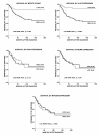Ki-67 expression is superior to mitotic count and novel proliferation markers PHH3, MCM4 and mitosin as a prognostic factor in thick cutaneous melanoma
- PMID: 20398247
- PMCID: PMC2868809
- DOI: 10.1186/1471-2407-10-140
Ki-67 expression is superior to mitotic count and novel proliferation markers PHH3, MCM4 and mitosin as a prognostic factor in thick cutaneous melanoma
Abstract
Background: Tumor cell proliferation is a predictor of survival in cutaneous melanoma. The aim of the present study was to evaluate the prognostic impact of mitotic count, Ki-67 expression and novel proliferation markers phosphohistone H3 (PHH3), minichromosome maintenance protein 4 (MCM4) and mitosin, and to compare the results with histopathological variables.
Methods: 202 consecutive cases of nodular cutaneous melanoma were initially included. Mitotic count (mitosis per mm2) was assessed on H&E sections, and Ki-67 expression was estimated by immunohistochemistry on standard sections. PHH3, MCM4 and mitosin were examined by staining of tissue microarrays (TMA) sections.
Results: Increased mitotic count and elevated Ki-67 expression were strongly associated with increased tumor thickness, presence of ulceration and tumor necrosis. Furthermore, high mitotic count and elevated Ki-67 expression were also associated with Clark's level of invasion and presence of vascular invasion. High expression of PHH3 and MCM4 was correlated with high mitotic count, elevated Ki-67 expression and tumor ulceration, and increased PHH3 frequencies were associated with tumor thickness and presence of tumor necrosis. Univariate analyses showed a worse outcome in cases with elevated Ki-67 expression and high mitotic count, whereas PHH3, MCM4 and mitosin were not significant. Tumor cell proliferation by Ki-67 had significant prognostic impact by multivariate analysis.
Conclusions: Ki-67 was a stronger and more robust prognostic indicator than mitotic count in this series of nodular melanoma. PHH3, MCM4 and mitosin did not predict patient survival.
Figures



Similar articles
-
Mitosin and pHH3 predict poorer survival in astrocytomas WHO grades II and III.J Clin Pathol. 2016 Jan;69(1):26-34. doi: 10.1136/jclinpath-2015-202983. Epub 2015 Jul 17. J Clin Pathol. 2016. PMID: 26188054
-
Immunodetection of phosphohistone H3 as a surrogate of mitotic figure count and clinical outcome in cutaneous melanoma.Mod Pathol. 2013 Sep;26(9):1153-60. doi: 10.1038/modpathol.2013.59. Epub 2013 Apr 5. Mod Pathol. 2013. PMID: 23558574
-
Prognostic importance of the mitotic marker phosphohistone H3 in cutaneous nodular melanoma.J Invest Dermatol. 2012 Apr;132(4):1247-52. doi: 10.1038/jid.2011.464. Epub 2012 Feb 2. J Invest Dermatol. 2012. PMID: 22297638
-
Paradoxical results obtained with Ki67-labeling and PHH3-mitosis index in glial tumors: a literature analysis.Clin Neuropathol. 2017 Nov/Dec;36(6):272-282. doi: 10.5414/NP301028. Clin Neuropathol. 2017. PMID: 28853695 Review.
-
Biomarkers in melanoma.Ann Oncol. 2009 Aug;20 Suppl 6(Suppl 6):vi8-13. doi: 10.1093/annonc/mdp251. Ann Oncol. 2009. PMID: 19617299 Free PMC article. Review.
Cited by
-
Mitotic rate in melanoma: prognostic value of immunostaining and computer-assisted image analysis.Am J Surg Pathol. 2013 Jun;37(6):882-9. doi: 10.1097/PAS.0b013e31827e50fa. Am J Surg Pathol. 2013. PMID: 23629443 Free PMC article.
-
Increased Tc22 and Treg/CD8 ratio contribute to aggressive growth of transplant associated squamous cell carcinoma.PLoS One. 2013 May 7;8(5):e62154. doi: 10.1371/journal.pone.0062154. Print 2013. PLoS One. 2013. PMID: 23667456 Free PMC article.
-
Cancer stem cells and field cancerization of head and neck cancer - An update.J Family Med Prim Care. 2020 Jul 30;9(7):3178-3182. doi: 10.4103/jfmpc.jfmpc_443_20. eCollection 2020 Jul. J Family Med Prim Care. 2020. PMID: 33102266 Free PMC article. Review.
-
Role of Biomarkers in the Integrated Management of Melanoma.Dis Markers. 2021 Dec 30;2021:6238317. doi: 10.1155/2021/6238317. eCollection 2021. Dis Markers. 2021. PMID: 35003391 Free PMC article. Review.
-
Proliferation Marker Ki67 as a Stratification Index of Adjuvant Chemotherapy for Resectable Mucosal Melanoma.Front Oncol. 2022 Jun 30;12:895672. doi: 10.3389/fonc.2022.895672. eCollection 2022. Front Oncol. 2022. PMID: 35847851 Free PMC article.
References
-
- Thompson JF, Scolyer RA, Kefford RF. Cutaneous melanoma. Lancet. 2005;365(9460):687–701. - PubMed
-
- Balch CM, Soong SJ, Gershenwald JE, Thompson JF, Reintgen DS, Cascinelli N, Urist M, McMasters KM, Ross MI, Kirkwood JM. Prognostic factors analysis of 17,600 melanoma patients: validation of the American Joint Committee on Cancer melanoma staging system. J Clin Oncol. 2001;19(16):3622–3634. - PubMed
-
- Balch CM, Buzaid AC, Soong SJ, Atkins MB, Cascinelli N, Coit DG, Fleming ID, Gershenwald JE, Houghton A Jr, Kirkwood JM. Final version of the American Joint Committee on Cancer staging system for cutaneous melanoma. J Clin Oncol. 2001;19(16):3635–3648. - PubMed
Publication types
MeSH terms
Substances
LinkOut - more resources
Full Text Sources
Medical

